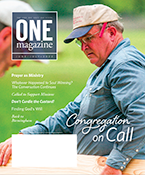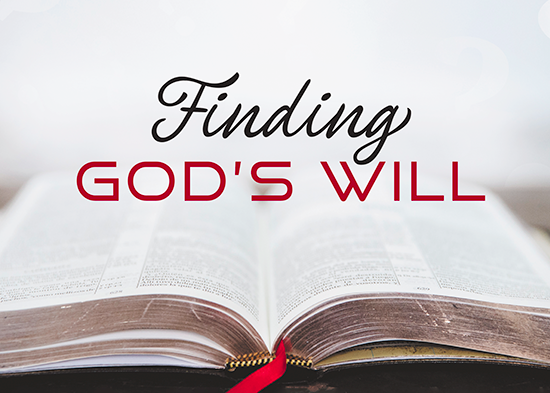
June-July 2022
Congregation on Call
------------------
|





Finding God's Will
By Zach Maloney
How many of us know what we will face in the future? If anything, the last two years have reminded us of the uncertainty of life and the importance of daily decisions. Some of these decisions alter the course of our lives significantly. The decision might be whether to relocate to another city. Some might make a significant financial decision. It might be a decision on dating and marriage. Processing these decisions can be paralyzing. The question we should consider is whether the Bible speaks to the direction we should take.
The phrase “finding God’s will” often comes up when people are trying to make difficult decisions. God certainly gives us help in finding His will for our lives. He does not want us to be in the dark, wandering about with no purpose. Scripture tells us He has given us everything required for life and godliness through the knowledge of Him (2 Peter 1:3).
In processing a particular decision, it helps to think through God’s revealed will and His concealed will. His revealed will tells us how He wants us to live, according to the Scriptures. We do not have to pray about it or walk around looking for it. His revealed will is contained in the 66 books He has given us.
God’s concealed will, which lies outside of Scripture, is where decision-making can become overwhelming. At times, God’s will exists beyond our awareness, since His ways are not our ways (Isaiah 55:8–9).
Consider how this framework applies to a specific decision related to work. God’s revealed will offers much help. Scripture tells us not to be lazy (Proverbs 20:4; 2 Thessalonians 3:10–11). We should desire to provide for our families and to work hard. But the specific career path we choose and how we prepare for it falls under God’s concealed will.
Start With God’s Revealed Will in Scripture
Often, our tendency is to focus on God’s concealed will when we face a difficult decision. However, it is always best to start with the things you know. And we know what God has told us in His Word. First, we must trust the Scriptures as authoritative in our lives. Paul writes in 2 Timothy 3:16, “All Scripture is given by inspiration of God and is profitable for doctrine, for reproof, for correction, for instruction in righteousness.” We must align our lives and decisions under the authority of the Scriptures.
We can see the testimony of Jesus resting in the sufficiency and authority of Scripture. Jesus emphasized the importance of every word in the Scriptures (Mark 12:24–27). Jesus also saw God as the ultimate source of Scripture and the Holy Spirit as the ultimate author (Matthew 15:4; 22:43).
After resting in the inspired Word as our foundation, we must let God’s Word guide our lives. We find an example of this in Acts 1, after Jesus ascended into heaven. The disciples were left waiting and praying while needing to decide how to fill the office of an apostle. Judas had betrayed Jesus and died, and the disciples needed someone to replace him. During this decision-making process, Peter referenced Psalm 69:25 and Psalm 109:8 as a guide for their thinking. Furthermore, Jesus placed Himself under the authority of the Old Testament when He obeyed it as God’s Word (Matthew 4:4, 7, 10; Luke 24:25–26).
We are prone to bend our interpretation of Scripture to fit our circumstances rather than the other way around. A believer cannot accept the authority of Scripture without accepting the Word as God’s authoritative revelation.
Next, Look for God’s Concealed Will in Scriptures.
While Scripture serves as our foundation in the decision-making process, questions not directly addressed by God’s revealed will may remain. In these situations, we should work to gather information about the decision at hand. Going back to the previous example, when the disciples needed to find another apostle, they introduced two candidates to fill the office. They presented two people and prayed. In this model, think about the decision you are facing and pray. Seek counsel from others you trust who have made similar decisions.
Prayer is essential for finding the concealed will of God. Prayer is not necessarily a means of getting extra communication from God but rather a means to draw us closer to Him. Prayer should not be used to bend God to fit our will. Those who think God can be coerced through prayer, whether for material or financial gain, seem to assume He is reluctant to bless us or completely unaware of our needs. Neither assumption is true.
With Scripture as the foundation, prayer changes our internal perspective on God’s will.
As David Jones writes, “Such fellowship in prayer, accompanied by personal reflection, can lead to a deeper knowledge of Scripture, the eyes of one’s heart being enlightened (see Ephesians 1:18), greater confidence in God’s Word, as well as a better overall understanding of how biblical truth applies to one’s life.”
Prayer is intrinsically good, even apart from the answers we receive in our decision-making. Having a correct posture towards prayer allows us to rest in the promise God is willing, aware, and able to guide our decision-making.
Remember, God is still at work.
God did not just wind up the world like a clock and leave it to run itself. He is still active in the world. He still sustains and preserves life. He still rules and directs all things in service to His redemptive plan. And He delights in using those He made in His image to take part in this redemptive plan.
He loves His creation to the point He revealed Himself through the written Word. There, in His revealed will, believers are instructed to avoid worry or fret over the secret will of God. Instead, Jesus encouraged His followers to seek God’s Kingdom and righteousness first, understanding the details and decisions of life will then become clear (Matthew 6:33).
The best way to “find God’s will” regarding your decisions is to make those decisions based on Scripture. You can be confident Scripture leads to human flourishing in every area of life.
About the Author: Zach Maloney lives in Dayton, Ohio, where he serves as a Hospice Chaplain. He holds degrees from Welch College (B.A., Pastoral Ministry) and Southeastern Baptist Theological Seminary (M.Div., Christian Ethics). Zach also completed a CPE internship at WakeMed in Raleigh, NC (2018) and completed a CPE residency at UK HealthCare in Lexington, KY (2020). His interests include the ethics of life and death, systematic theology, and pastoral care to suicide-prone persons. Read more from Zach at the Helwys Society Forum.
|
|

